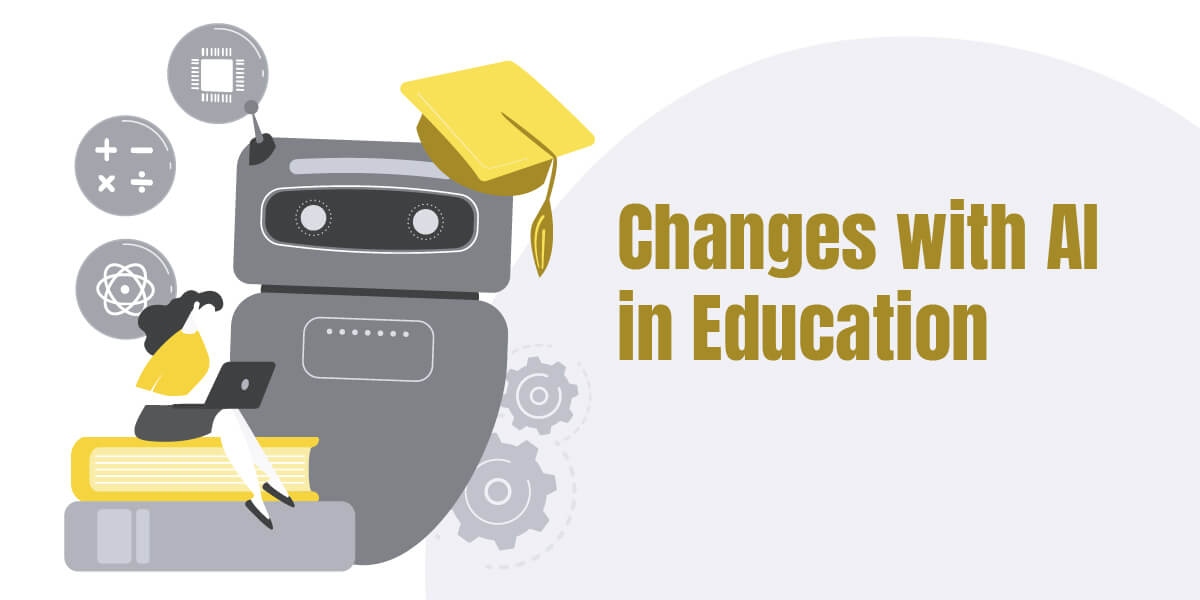The education industry may be sluggish to adopt some of the most cutting-edge technologies like artificial intelligence and machine learning. However, the advantages of artificial intelligence in education are compelling many institutions to reconsider their ways. The power to transfer manual, repetitive work to software can alter a range of school procedures for both students and instructors. AI may aid in the optimization of both teaching and learning activities, allowing many aspects of the education system to blossom into a new style. The positive impact of technology on education has made the life of teachers and students easier.
The following are the various ways in which artificial intelligence in education is transforming the industry.
Improved productivity and efficiency due to automation
- Grading takes up a substantial amount of time for teachers in schools. This time could be allocated for interacting with students, preparing for classes, or focusing on teacher training.
- While the use of AI in education may never completely replace human grading, it is getting close. Teachers can automate grading for almost all types of multiple – choice questions and fill-in-the-blank tests, thanks to the adoption of artificial intelligence in education.
- A significant impact of technology on learning is that it will allow teachers to focus more on in-class activities and student engagement than grading.
- Teachers in schools spend the majority of their time on administrative tasks rather than on students.
- Most of the manual work pertaining to education can easily be automated by implementing artificial intelligence. This will help make the learning process for students more efficient and faster.
- Moving ahead into the future, the advancement of technologies and use of artificial intelligence in schools will save students and teachers valuable time and cut-down on various unproductive activities.
Flexible learning environment
- Artificial intelligence in education has made teaching more responsive and versatile.
- Students in the classroom are unique and different from each other. Some of them can read words and interpret visual information more effectively than others. Others are exactly opposite.
- Artificial intelligence can assist instructors in tailoring their learning environments to their preferences.
- AI’s adaptability and versatility in the classroom has a significant educational impact.
- Traditional educational institutions and curricula do not adequately cater to the needs of students. They are capable of meeting about 80% of their learning requirements.
- AI can create a learning environment that adapts to an individual’s needs and makes education more fruitful.
Personalized learning experiences
- Not every student learns in the same way. Some students learn quickly, while others take their time learning.
- The traditional educational model lacked the notion of personalized learning for each individual learner.
- This is where artificial intelligence in education comes into play.
- Even when students learn remotely, artificial intelligence may provide more tailored learning experiences.
- It can assist in identifying their most pressing needs, allowing teachers to showcase their students’ abilities, and filling the gaps.
- To maximize the benefits of AI, teachers often examine the data it generates and employ it to present students with real feedback that they can then apply independently.
- In addition, AI systems may give specific information on how kids are progressing.
Gamification in learning
- Gamification in education refers to educators using game design elements in an academic setting. Typically, the idea is to make learning more engaging.
- Learning through games makes difficult concepts enjoyable, simple, and participatory for learners.
- Gamification boosts students’ attention spans while also making teaching easier. Learning through games is already widespread in early childhood education.
- Some developmental games teach children about how the world works. This innovative method of learning, on the other hand, may be utilized in higher education, assisting students in acquiring desired abilities.
- Students with learning disabilities demand a unique educational approach.
- All of this is made possible by artificial intelligence, which allows learning to be customized as well as concentrated.
Smart educational content
- The use of AI in education is transforming the industry by offering new ways for students to excel.
- Smart content is a popular notion among educators, schools, and students since it simplifies learning.
- It refers to a range of virtual materials such as electronic textbooks, instructional videos, and videoconferencing.
- AI-powered robots enhance the learning experience by providing students with customizable learning environments and digital content.
AI-powered educational platform
- With AI in education, students can now get access to an eLearning platform that is not only tailored to their specific requirements, but can also instruct them in places that human instructors cannot.
- For example, AI teaching systems often operate on information gathered from numerous sources, thoroughly processed, and then confirmed.
- A human tutor cannot keep up with developments and breakthroughs at the same pace as AI.
- Furthermore, AI systems have a high tendency to monitor student development more accurately.
- They can identify students’ weak points and alter the curriculum to overcome knowledge gaps.
- AI can also help students better fulfill their learning needs based on the information acquired.
Virtual assistants and AI chatbots
- Chatbots may respond to students at any time of day or night. If a student has a query for their instructor in the middle of the night, a chatbot may respond in seconds.
- A chatbot, based on how it is created, can respond to a learner in a compassionate manner.
- This can inspire students to ask additional questions without fear of being judged based on the number or nature of their questions.
- Furthermore, virtual assistants can provide a personalized experience by tailoring teaching approaches to particular students and assisting them in focusing on levels of improvement.
While many facets of artificial intelligence in education are still abstract, some are currently in use, assisting students and instructors across the globe in streamlining the educational process.

